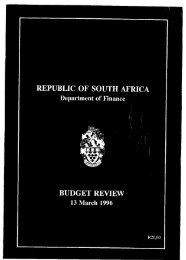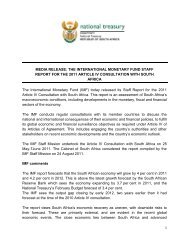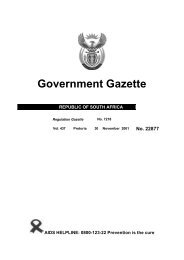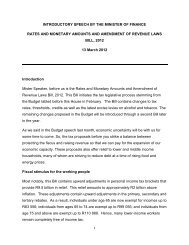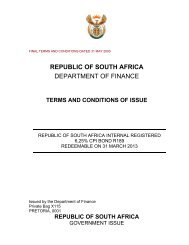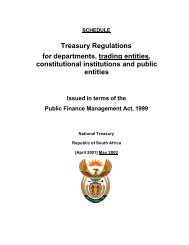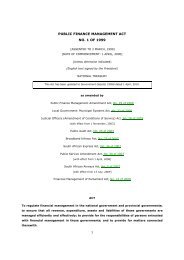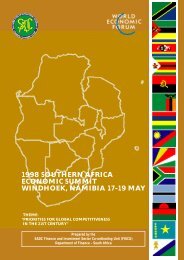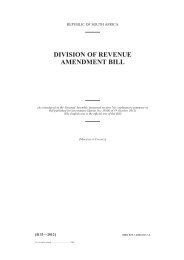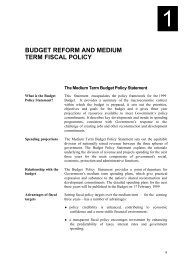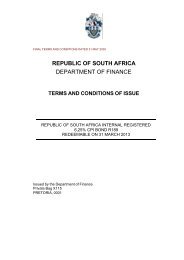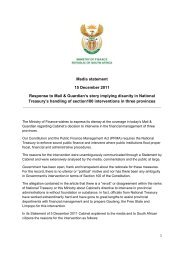Annual Performance Plan Jaarlikse ... - National Treasury
Annual Performance Plan Jaarlikse ... - National Treasury
Annual Performance Plan Jaarlikse ... - National Treasury
You also want an ePaper? Increase the reach of your titles
YUMPU automatically turns print PDFs into web optimized ePapers that Google loves.
While there is universal enrolment of children of ages 6 – 15 in the Western Cape, not all five year-olds have access to<br />
Grade R. he province’s second HCDS goal is to provide high quality learning programmes to all five year-old children in<br />
the Western Cape at the first level of formal education, namely Grade R by 2010, so that they are introduced to early<br />
reading and numeracy skills. This is particularly important in communities where parents are illiterate and homes are<br />
text and resource poor. The NCS Grade R curriculum spells out the knowledge and skills that ought to be taught to five<br />
year-olds. The human resource challenge for the province is to ensure that the learning outcomes of the Grade R NCS<br />
are taught and acquired by learners in Grade R sites.<br />
If conservative estimates of 2006 participation rates in the Western Cape are used, that is 60 000 of a possible 80 000<br />
learners (age cohort), then an additional 20 000 children must be reached in the period to 2010. This means enrolling<br />
on average 6 000 additional five year-old children each year in the period to 2010. But these children must also be<br />
enrolled in high quality programmes because the provision of Grade R programmes to young children is based on the<br />
assumption that these programmes provide a solid foundation and advantage for learning in school. This assumption is<br />
supported by a number of studies, including the national systemic assessment study of Grade 3 learners undertaken in<br />
2001 as well as the provincial systemic evaluation conducted in 2004 and 2006.These studies show a high correlation<br />
between reading and numeracy performance at the Grade 3 level and access to pre-school programmes.<br />
To provide high quality Grade R tuition to all five year-olds so that they are ready for school learning, the WCED will<br />
implement the following short to medium term plans -<br />
• Advocacy and recruitment of added learners, particularly in the rural and poor areas.<br />
• Establishment of classes in public schools where space allows.<br />
• Ensuring that each class has a suitably qualified teacher.<br />
• Ensuring that there is adequate LTSM for quality teaching and learning<br />
• Continue to support the DSD in upgrading the qualification of care-givers/practitioners in terms of the EPWP.<br />
• Monitoring to be done at District Level by Curriculum Advisers and Circuit Managers<br />
Progress analysis<br />
Access to Grade R has increased from approximately 21 000 in 1996 to in excess of 60 000 in 2006.During 2006 every<br />
Grade R child at an institution was subsidised instead of a maximum class size of 30. This has increased the number of<br />
children qualifying for financial assistance.<br />
The abolition of departmentally approved posts and their replacement by means of per capita subsidies has allowed greater<br />
access in poorer areas. However, this has had unintentional consequences – salaries have been drastically lowered in the<br />
poor institutions, qualified teachers have migrated to the affluent institutions and there has been a drastic fall off in students<br />
willing to enter this sector as educators. This has also resulted in courses at training institutions being abolished.<br />
Analysis of constraints and measures planned to overcome them<br />
It is difficult to ascertain exact numbers of Grade R learners because many of the Community Sites are in remote rural areas<br />
or in informal settlements where communication is a severe challenge. Snap and <strong>Annual</strong> Survey forms are not returned.<br />
EMDC Officials are overloaded and are not able to visit the sites regularly to ensure quality programmes are being offered.<br />
Many of the tasks of monitoring and support are supposed to be provided by Circuit Managers and Administration Officials,<br />
but there is limited capacity in these pillars.<br />
These issues are receiving continued attention to improve the efficiency and effectiveness of the ECD sector.<br />
<strong>Annual</strong> <strong>Performance</strong> <strong>Plan</strong> 2007/08 – 2009/10<br />
69



